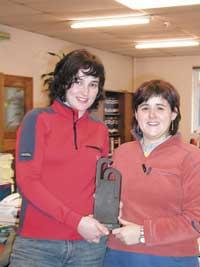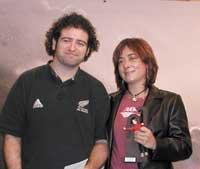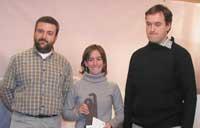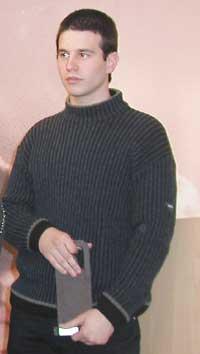Conversing with the winners
Author(s): Oihana Izagirre and Oihane Lakar
You have written about the ecology of rivers, a current issue, no doubt. How did you choose this topic for the article?
(Oihana) I am doing a thesis on the ecology of rivers and Oihane helps us in sampling. We wanted to write and it was clear the subject I needed.
What is the situation of the Basque rivers?

Some are fine, for example, the Urumea up to Hernani is fine, Zarama too... As for chemical quality, Deba is the worst. But, in general, they are recovering. Morphologically the situation is not so good: when there are canalizations, there are no riverside forests… In that sense they are very bad.
The truth is that a new European law requires that by 2015 all rivers are in good ecological condition. The good ecological condition requires that the river has all the algae, invertebrates and fish that correspond to it, the proper rooting, the proper metabolism... and that the riparian forests are in a good morphological state, that is, they are in the best possible morphological state, for example, to enable the migrations of fish.
Will the law be enforced by 2015 in the rivers of Euskal Herria?
All Euskal Herria biologists should work. The rivers are much better than a few years ago, but there is still much to be done.
What exactly should be done?
The objective would be to take as reference the rivers in good condition and achieve this situation in other rivers. The problem is that there is no systematic measurement methodology. And this methodology is one of the objectives of our work.
Will other European countries have as many problems to comply with the law as we do?
There are very different situations. In many villages in Europe they have more tradition than us in this kind of thing, and the rivers with the worst situation are the best in the Basque Country. Countries in bad shape by unifying the law in all states will not be able to stay behind and fines are expected.
Author(s): Aitzol Ezeiza, Karmele Lopez de Ipiña and Montxo Lopez de Ipiña
The title of your work reminds the Blade Runner androids, some of whom felt emotions. What do they say in the article?
Those of us in robotics sometimes make robots quite cold and we talk about it. Montxo interprets ideas through images.

With what objectives are robots manufactured?
The goal is to help us and not put more obstacles. The world of robotics is studying that. Humanity is an important factor. For example, if you work with a computer, a good answer is for that machine to be able to interpret your emotions. It is coming. And to make any rational decision is increasingly accepted than to take into account emotions.
3rd Prize:
Author(s): Aitziber Mendiguren, Luis F. Callado and Joseba Pineda

Why have you chosen caffeine as a subject?
In general, in the department we investigate substances related to dependence. That's why we choose caffeine. In addition, it is the most consumed stimulant in the world.
Does caffeine cause addiction?
It distinguishes between physical and psychic dependence. The chemical sign of abstinence has been observed in animals and humans, so it can generate physical dependence. Psychic dependence, that is, if we are able to leave the drug freely, has not yet been shown. For the writing of the article we have researched many works, but we have not reached clear conclusions, since it influences differently to other drugs.
Author: Related information

What did you write about in the article?
I have written about nuclear energy. I have tried to explain the nuclear fusion and the Iter project.
Why did you put that title to the article?
The fusion energy appears in the stars: helium and hydrogen gases are merging into the nucleus and thus emit the light that reaches us. This energy is clean and simple to obtain raw materials. But very high temperatures are needed and so far it has not been achieved that the energy generated is higher than that used. The Iter project aims to achieve this.
Buletina
Bidali zure helbide elektronikoa eta jaso asteroko buletina zure sarrera-ontzian











